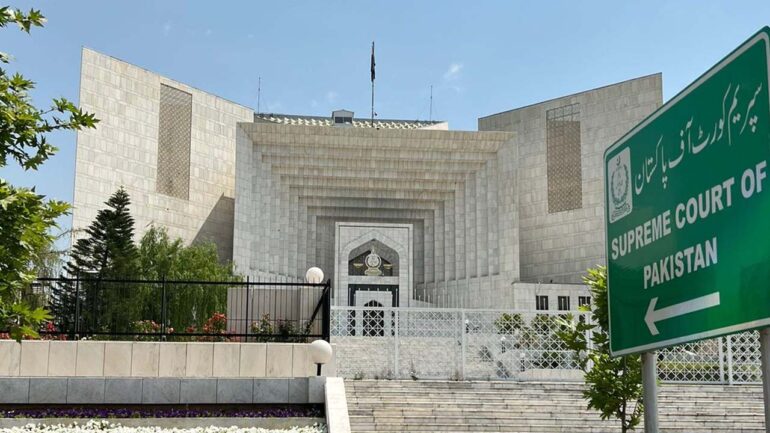The Supreme Court rejecting the government’s fact-finding committee formed to probe into the 2017 Faizabad sit-in has ordered to establish a new inquiry commission for implementation of its verdict in the case.
The initial fact-finding committee, constituted by the government on October 27, was tasked with investigating the “role and directions” of all “concerned” officials involved in managing the sit-in staged by the Tehreek-e-Labbaik Pakistan against the then-Pakistan Muslim League-Nawaz (PML-N) government in 2017.
The Supreme Court’s decision for a new inquiry commission came during the hearing of several petitions challenging the February 6, 2019, judgment in the Faizabad dharna case. On that day, the Supreme Court bench, led by Chief Justice of Pakistan (CJP) Qazi Faez Isa and Justice Mushir Alam, ruled that intelligence agencies must operate within their mandates.
Despite multiple pleas challenging the SC verdict, including submissions from the federal government, Ministry of Defence, the Pakistan Electronic Media Regulatory Authority (Pemra), the Intelligence Bureau (IB), the Election Commission of Pakistan (ECP), and Pakistan Tehreek-Insaf (PTI), several petitioners withdrew their applications.
During the today’s hearing, CJP Isa expressed his frustration, questioning the reluctance to speak the truth. He dismissed review pleas from IB, PTI, the defence ministry, MQM, and Ijazul Haq for withdrawal.
Additionally, the court issued notices to Sheikh Rashid for failure to appear and adjourned the hearing till November 15.
During the hearing, the CJP emphasized the need to uncover the mastermind behind the Faizabad sit-in. Expressing disappointment over the lack of implementation since the 2019 decision, he criticized the government’s handling of the case, suggesting that the country was only for the elites, with no regard for the nation’s interests.
CJP Isa questioned the involvement of external elements, specifically mentioning the 2014 sit-in where a person from Canada, likely referring to Pakistan Awami Tehreek (PAT) chief Tahirul Qadri, played a prominent role.
He raised concerns about the individual’s potential influence in future events and sought clarity through the investigation.
During the hearing, Pemra’s former chairman, Absar Alam, alleged interference from intelligence agencies in media affairs, shedding light on the manipulation of media policies through unlawful means. He revealed instances of verbal orders and highlighted the removal of journalist Najam Sethi from his position, underlining the deep-rooted complexities surrounding the Faizabad sit-in case.



